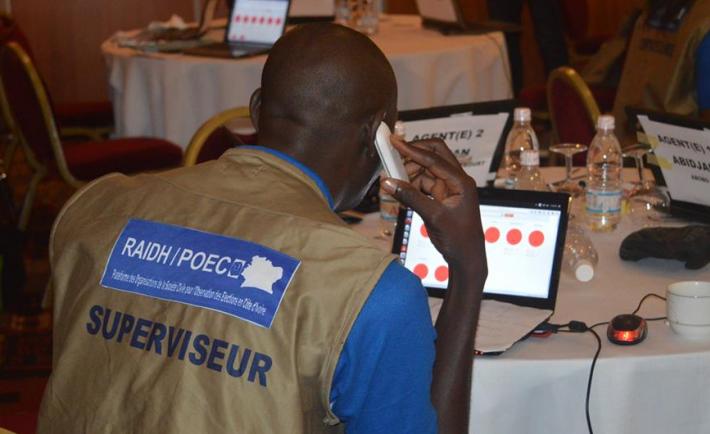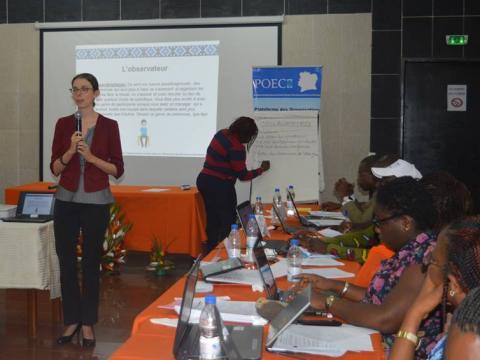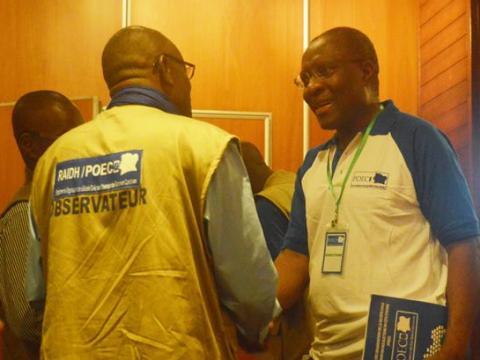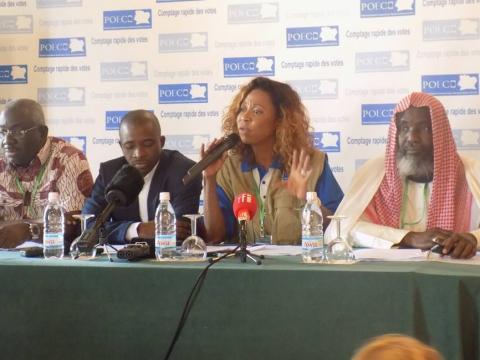A largely peaceful presidential election held on October 25 was the first since more than 3,000 people were killed and hundreds of thousands internally displaced in the aftermath of Côte d’Ivoire’s disputed 2010 election. Successful citizen election observation efforts helped civil society organizations in Côte d’Ivoire establish their credibility, which was damaged after conflicting reports in 2010 helped fuel post-election turmoil.
In the 2010 race, then-President Laurent Gbagbo and Opposition Leader Alassane Ouattara both claimed victory. In the turmoil that followed civil society organizations (CSOs) helped fuel uncertainty by releasing conflicting reports on the outcome and vote totals. Even though the United Nations and the Independent Electoral Committee both certified Ouattara as the victor, Gbagbo refused to step down, initiating a five-month crisis that ended with Gbagbo's arrest, Ouattara’s inauguration and the Ivorian social fabric deeply scarred.
NDI supported 14 CSOs to form the Platform of Civil Society Organizations for the Observation of Elections in Côte d’Ivoire (Plateforme des organisations de la société civile pour l’Observation des élections en Côte d’Ivoire - POECI) to conduct the country’s first-ever systematic citizen election observation, which collected credible data on the electoral process and constructively engaged state institutions, political parties and other public actors.
The observation effort was designed not only to provide an independent check on the conduct of the election, but also to help rebuild the credibility of CSOs and play a constructive role in the election. Starting with voter registration in June 2015 and continuing through election day, POECI worked with the Independent Electoral Commission (Commission Electorale Indépendante - CEI) to share findings and recommendations from its observation activities and to obtain appropriate accreditation for its observers.
POECI conducted the most rigorous nation-wide parallel vote tabulation or PVT ever to be organized in Francophone Africa. PVT is a statistically valid methodology that allows citizen observers to independently verify election results. POECI observers used cell phones and standardized checklists to provide near-real time data on key aspects of the voting and counting process, including the opening and closing times for polling stations, presence of appropriate electoral materials, deployment of new biometric authentication technology, adherence to the electoral code, while also enabling impartial citizen observers to independently estimate election results within a given margin of error.
On election day, POECI deployed observers to a representative sample of 755 polling stations across the country, covering each of the 14 districts, 31 regions and 107 departments of Côte d'Ivoire. Their conclusions were sent to a centralized database in Abidjan using coded text messages for rapid processing by trained statisticians. POECI ultimately received 5,285 observer reports by SMS, including 396,375 data points or 100 percent of the data expected from on the sample -- the highest response rate attained to-date in an NDI-supported PVT in Africa. Also of note, 40 percent of POECI’s observers were women, making the effort the most gender-balanced PVT that NDI has ever conducted in Sub-Saharan Africa. Furthermore, checklist questions addressed aspects of women’s experience on election day, such as the participation of women as polling agents, presiding officers and in providing extra scrutiny.
Drawing on the findings and conclusions of its data, POECI issued a total of four statements about the electoral process, noting the largely smooth conduct of the election despite the late opening of some polling stations and challenges with the introduction of biometric authentication kits. POECI also released independent estimates of voter turnout and the results, which confirmed the figures ultimately released by the CEI. Although the CEI announced a provisional turnout figure of approximately 60 percent, which exceeded the independent estimate released by POECI, the final figure announced by the CEI (52.86 percent) fell within the PVT margin of error. The results released by the CEI, which showed President Alassane Ouattara winning reelection with 83.66 percent of the vote and runner-up Affi N’Guessan coming in second with 9.29 percent, also aligned with the results estimates obtained by the PVT. Overall, POECI concluded that the procedures recommended by the CEI were generally followed, and that Ivorians were afforded credible and peaceful opportunities to go to the polls.
Unlike the 2010 election, Mr. N’Guessan conceded defeat and did not challenge the legitimacy of the vote totals. Several opposition candidates also acknowledged president Ouattara’s victory and representatives from many foreign countries attended Ouattara’s inauguration. Nevertheless, there is still room for improvement as Ivorians look towards legislative elections and a possible constitutional referendum in the months ahead. Significant swathes of the population abstained from the polls, suggesting that further efforts to reconcile and unite a once deeply divided country are needed. NDI’s partnership with POECI’s seminal PVT and data-driven approach is charting a new course for citizen observation in Francophone Africa. Even more importantly, it has enhanced the credibility of civil society to help Côte d’Ivoire heal from its past.



%20posing%20with%20polling%20observers%20from%20the%20african%20union%EF%B9%96itok=DkGNrght.jpg)



%20posing%20with%20polling%20observers%20from%20the%20african%20union%EF%B9%96itok=rF9XCyQV.jpg)

